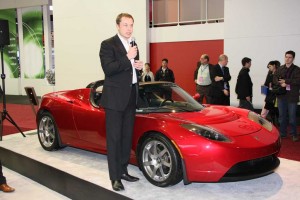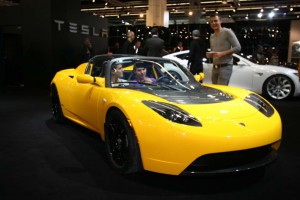
After facing tough times, early this year, Elon Musk's battery car start-up, Tesla Motors, is on track to introduce an EV family sedan by 2012.
Few folks took Elon Musk seriously when he announced plans, a few years back, for an all-new electric vehicle company. After all, he seemed to have everything going against him. A well-intended effort, by the State of California, to mandate electric vehicles had failed, in the 1990s, and the price of admission into the auto industry, even with more conventional technology, is enormous.
But Musk, a billionaire entrepreneur, whose ventures have ranged from PayPal to SpaceX, a company pioneering private manned space flight, wasn’t about to walk from a dream he’s had since his teen years, and in late 2008, after a variety of setbacks, Silicon Valley-based Tesla launched production of its new, high-performance Roadster sports car. Now, with a mix of fresh private capital and a big infusion from the Department of Energy, Tesla hopes to move battery power closer to the mainstream, with the introduction of the Model S, a $57,000 family sedan.
While there are still plenty of hurdles to overcome, Tesla resolved one of the thorniest, today, with an amicable settlement between Musk and the company’s co-founder, Martin Eberhard, who issued a statement, declaring, “We can now focus on the most important issue: making electric vehicles successful, something we both are passionate about.”
While neither of the co-founders will discuss their settlement, TheDetroitBureau.com did find Musk in an expansive mood when asked about his company, battery technology, and the many critics who’re now unveiling battery cars of their own.

Tesla introduced the latest, "Version 2.0", of its Roadster sports car during the 2009 Frankfurt Motor Show.
TheDetroitBureau: You unveiled a new version of the Roadster, in Frankfurt, last week. How does it differ from the original car?
Musk: Internally, we call it Version 2.0, and while it doesn’t have the huge changes we made earlier in the year, with the version we call 1.5, we focused on a big cost-down program, which meant working on things like body tooling, seats and the entire powertrain. And with the addition of the sportier version, we can now make 0 to 60 in just 3.7 seconds.
TDB: Early on, there seemed to be something of a clash of cultures, with the traditional automotive folks you’d hired pushing for a go-slow approach, to work out the bugs, and, we hear, the Silicon Valley types who wanted to move fast, get the Roadster on the road, and fix problems as they popped up, just like a software company.
Musk: I wouldn’t say there was a culture clash, but I do have very high performance standards. Remember, I have seven years experience in the rocket business, where perfect is just a passing grade. But I made some serious mistakes (initially) in trusting some people, which contributed to serious cost overruns and delays. I also learned the critical importance of the supply chain, and making sure your suppliers do what they say they can. You can’t ship a car without all the parts.
TDB: How does that impact the development of your upcoming family sedan, the battery-powered Model S?
Musk: With Model S, we have a much more robust supply chain and incorporating quite a bit more that we will do in-house, including stamping, paint and vehicle assembly. The body fabrication that Lotus did for the Roadster will now be done by us. I’m a big believer in in-sourcing, which I feel is the right way to go. The electronics industry is an anomaly, and even there, some of the biggest manufacturers, like Intel and Cisco do a lot of their own work.
TDB: You briefly had to put the Model S project on hold, waiting to see if you could get some money from private sources, as well as a big infusion from the Department of Energy program created to encourage high-mileage, low-emissions technology. How has that worked out?
Musk: We did have a tough time, at the end of the last year and early this year, as many companies did; in fact it was particularly rough because it happened just as we were ramping up for Model S. There simply was no money. We had to lay off 20 percent of our staff. But we’ve raised significant private capital, including $80 million, earlier this month, from Fjord Capital (Partners Limited). Tesla has not received any government money, to date, but we now have approval…for $465 million.
TDB: That’s an astounding amount of money for a start-up that has produced only a handful of cars, so far.
Musk: The approval process was very rigorous. The DoE brought in an army of inspectors to look at our numbers. Any BS there and they would have caught it.
TDB: And when will the Model S hit market?
Musk: We’ve said all along that it would be roughly 2.5 years from the (receipt) of DoE funding, which is still a little delayed, probably to November. There’s still a chance we could be in production by the end of 2011, but I’m confident it will not be beyond 2012.
TDB: And the cost?
Musk: Were still confident we can deliver an awesome car for $49,900, after the federal credit, or $57,400 before. And if gas is at $4.50 by then, it will look as if you are buying a $35,000 car (when you factor in lower operating costs). That’s pretty affordable.
TDB: At the Detroit Auto Show, last January, there were plenty of skeptics about electric power, in general, and Tesla, in particular. That’s changed, considering almost every maker at the Frankfurt Motor Show unveiled at least one electric vehicle.
Musk: I’m truly glad to see a movement in the direction of electric cars. The reason I put so much money into the creation of Tesla was to be a catalyst in the electric car revolution. It’s been a passion of mine for 20 years, something I used to but my dates about, in college. We’re seeing more and more people on the road, more people pushing other customers. It’s kind of viral.
TDB: But aren’t you worried about the big-name automakers who are now going to compete directly with Tesla?
Musk: That’s great. That was the goal. Tesla will do well as long as we make good products. To say a car company is the best way to get a return on your investment is absurd, though Tesla will do well for its shareholders. And regardless of the outcome, it won’t change my lifestyle one iota.


Elon Musk shouldn’t be labeled a “co-founder of Tesla Motors.” Eberhard and Mark Tarpenning founded the company in 2003, and while Musk was one of the first, if not the first, investors in the company, he didn’t start it. He just ran with it.